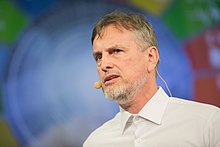Jürgen Schmidhuber
Jürgen Schmidhuber | |
|---|---|
 Jürgen Schmidhuber speaking at the AI for GOOD Global Summit in 2017 | |
| Born | 17 January 1963[1] |
| Residence | Switzerland |
| Nationality | German |
| Alma mater | Technische Universität München |
| Scientific career | |
| Fields | Artificial intelligence |
| Institutions | Dalle Molle Institute for Artificial Intelligence Research |
| Website | idsia |
Jürgen Schmidhuber (born 17 January 1963)[1] is a computer scientist who works in the field of artificial intelligence. He is a co-director of the Dalle Molle Institute for Artificial Intelligence Research in Manno, in the district of Lugano, in Ticino in southern Switzerland.[2]
Schmidhuber did his undergraduate studies at the Technische Universität München in Munich, Germany.[1] He taught there from 2004 until 2009 when he became a professor of artificial intelligence at the Università della Svizzera Italiana in Lugano, Switzerland.[3]
Contents
Work[edit]
In 1997, Schmidhuber and Sepp Hochreiter published a paper on a type of recurrent neural network which they called Long short-term memory. In 2015, this was used in a new implementation of speech recognition in Google's software for smartphones.[2]
In 2014, Schmidhuber formed a company, Nnaisense, to work on commercial applications of artificial intelligence in fields such as finance, heavy industry and self-driving cars. Sepp Hochreiter, Jaan Tallinn, and Marcus Hutter are advisers to the company.[2] Sales were under 11 million USD in 2016; however, Schmidhuber states that the current emphasis is on research and not revenue. Nnaisense raised its first round of capital funding in January 2017. Schmidhuber's overall goal is to create an all-purpose AI by training a single AI in sequence on a variety of narrow tasks; however, skeptics point out that companies such as Arago GmbH and IBM have applied AI to various different projects for years without showing any signs of artificial general intelligence.[4]
Views[edit]
Schmidhuber frequently criticizes modern deep learning researchers such as Yann LeCun for allegedly understating the contributions of Schmidhuber and other early machine learning pioneers. LeCun denies the charge, stating instead that Schmidhuber "keeps claiming credit he doesn't deserve".[2][5]
Recognition[edit]
Schmidhuber received the Helmholtz Award of the International Neural Network Society in 2013,[6] and the Neural Networks Pioneer Award of the IEEE Computational Intelligence Society in 2016.[7] He is a member of the European Academy of Sciences and Arts.[8][3]
References[edit]
- ^ a b c d CV
- ^ a b c d John Markoff (27 November 2016). When A.I. Matures, It May Call Jürgen Schmidhuber ‘Dad’. The New York Times. Accessed April 2017.
- ^ a b Dave O'Leary (3 October 2016). The Present and Future of AI and Deep Learning Featuring Professor Jürgen Schmidhuber. IT World Canada. Accessed April 2017.
- ^ "AI Pioneer Wants to Build the Renaissance Machine of the Future". Bloomberg.com. 16 January 2017. Retrieved 23 February 2018.
- ^ Oltermann, Philip (18 April 2017). "Jürgen Schmidhuber on the robot future: 'They will pay as much attention to us as we do to ants'". the Guardian. Retrieved 23 February 2018.
- ^ INNS Awards Recipients. International Neural Network Society. Accessed December 2016.
- ^ Recipients: Neural Networks Pioneer Award. Piscataway, NJ: IEEE Computational Intelligence Society. Accessed January 2019.]
- ^ Members. European Academy of Sciences and Arts. Accessed December 2016.